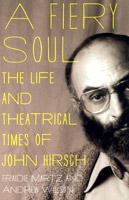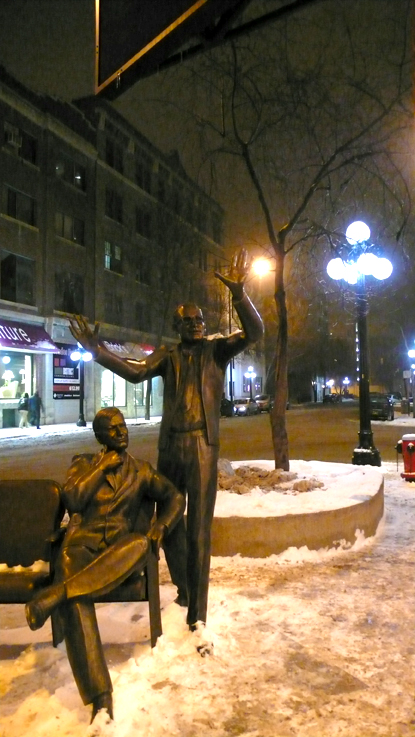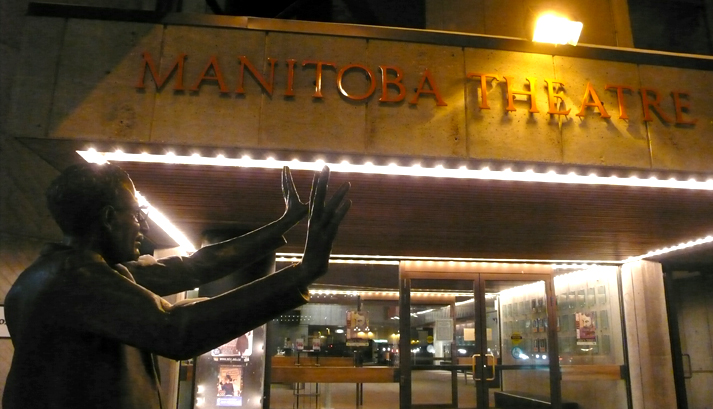January 15, 2012
A Fiery Soul – The Life and Theatrical Times of John Hirsch
Fraidie Martz and Andrew Wilson
Véhicule Press, 2011
Reviewed by Kevin Burns
Just before the table of contents, an actor explains the pervasive influence on contemporary theatre of the Hungarian-born, Canadian theatre innovator, John Hirsch. “During the 1980s, North American actors had to bring three things to any audition: a classical piece, a contemporary piece, and a John Hirsch story.”
Here’s mine.
[mks_pullquote align=”right” width=”300″ size=”14″ bg_color=”#c3d6b6″ txt_color=”#000000″]Read excerpts from A Fiery Soul . We thank the authors, Fraidie Martz and Andrew Wilson for permission to use these excerpts.
Related Links on this web site
How to be a Landed Immigrant by Magda Zalan
A 1957 Broadcast CBC Interview
More Manitoba Links
The Winnipeg Free Press website has an interesting John Hirsch photo archive
An online feature article by Andrew Wilson with additional excerpts from the biography[/mks_pullquote]
It’s 1978 and I am teaching theatre at Winnipeg’s Manitoba Theatre Workshop. John Hirsch is in town on family business and is giving a master class for professional actors. I’ve been invited to watch. There are six actors in the room, some very experienced, others quite young. All are nervous, after all, it’s the great man himself who is scrutinizing their every gesture. At this point in his career, Hirsch has moved on from the Manitoba Theatre Centre, the company he founded in 1958 with Tom Hendry, and is in a stormy relationship with CBC Television Drama. Today it’s not the politics of the CBC series The Beachcombers but Chekhov that has his attention. Within minutes, waiting for that mysterious sound of the axe in The Cherry Orchard, actors are rolling on the floor laughing one minute, and streaming passionate tears the next. Hirsch, all the while quietly encouraging them to do less and less. The intensity of Chekhov’s beguiling mix of the bitter-sweet and the tragicomic takes over the room. We leave, each with our John Hirsch story and eager to tell it.
Early in their book, the authors describe a similar disarming rehearsal process in New York, when actors were struggling with “method-based” psychological realism. They quote Hirsch’s notes to the company: “Actors who are not used to playing in classical theatre – who are only used to psychological approaches and naturalistic acting – have difficulty … What I demand are actors capable of a huge, passionate coolness.”
Huge, passionate coolness is the defining image for Hirsh’s life and artistic accomplishments as outlined by Martz and Wilson in this biography which is also a comprehensive history of recent decades of theatre and television in Canada.

Hirsch’s is a story of the experience of persecution, of resettlement, of reinvention through art, and of bearing the weight of a remarkable artistic gift. Where popular theatre biographies reach for breezy gossip, Martz and Wilson take a different approach. They interviewed those who really knew him and let their recollections and insights explain the context and drive the story of János Hirsch who was born May 1, 1930, in Siófok, on the shores of Lake Balaton in Hungary, a well-established Jewish community that practically disappeared. “Of the 550 Jews living in Siófok in 1939, a total of 79 survived the war,” they explain.
János/John fled Hungary, arriving, eventually, in Canada as a 17-year old orphan and refugee, but with a life experience of someone much older. “I chose Winnipeg, the spot in the centre, remembering my mother’s words to avoid extremes – the middle being the safest,” Hirsch wrote years later. Taken in by the kindly Alex and Pauline Shack, this tall and talented young man with a fascination for theatre – especially puppets – found himself in a new family and in a literally foreign cultural environment. Within five years he had learned English fluently, earned an honours degree at the University of Manitoba, and had directed successful plays at the Winnipeg Little Theatre. He was not “just passing through” Winnipeg. “No one wanted to stay in Winnipeg, ever. And that was terrible, because I had just got there,” he wrote. “And I also knew that I had to stay there.” And he did, more or less, after founding the Manitoba Theatre Centre, Winnipeg became the base during his many itinerant directing gigs on Broadway and his eventual – some would say legendary – artistic control of the Stratford Festival at an especially tempestuous time in that company’s history.
The authors depict Hirsch’s artistic adventurousness and set it in constant tension with administrative caution, not only at the Stratford Festival but also during his time at CBC Television. Peter Herrndorf, who also found refuge in Winnipeg just after the Second World War (in his case from Holland) brought Hirsch to CBC. He recognized the depth of talent in Hirsch’s stage productions in Winnipeg and recommended him for the job as head of Television Drama. “I spent probably a third of my time in Hirsch’s office,” remembers Herrndorf, “as he was either looking for advice about how to persuade the CBC to let him do certain things or try to keep the CBC from destroying his best ideas.”
Amid all the controversies, Hirsch’s adventurous productions of theatre, opera, and television drama attracted both accolades and awards, and critical drubbings and adulatory raves. In 1967, he was awarded the Order of Canada.
The critic Robert Enright interviewed a strangely subdued 58-year old Hirsch in 1988. “The older I grow,” Hirsch said, “the more I realize the incredible beauty of the world and already I’m raging about the fact that I’ll be going soon.” Martz and Wilson make a connection. “No one remembers Hirsch mentioning the word AIDS, though most of his friends correctly suspected the cause of his illness.”
Martz and Wilson offer no tidy conclusions in this moving portrait of a gifted and highly complex individual. They tell a true story, one about a life interrupted by violence and racism, a life transformed by the support of strangers who opened their doors to a refugee, a life revitalised by formal education, and a life driven by a passionate commitment to unfettered creative expression. It’s the contradictions that attract them. This internationally acclaimed artist and influential cultural figure was also “an expatriate Hungarian whose greatest comfort was a bowl of bableves; a non-Yiddish-speaking mensch who took decades to embrace his Jewishness fully; a sensual man whose sexuality was illegal for more than half his lifetime; and a grateful, enthusiastic Winnipegger who phoned home every Sunday and delighted to see his photo on the wall of the Kelekis family’s restaurant.”
John Hirsch died on August 1, 1989.
Do you have a John Hirsch story?
If you do, why not send it HERE and we will include a selection of them on this page.
John Hirsch is also the subject of one of the plays at Canada’s Stratford Festival this year.
More details at www.stratfordfestival.ca.
Outside today’s Manitoba Theatre Centre visitors can see John Hirsh and Tom Hendry – in bronze – looking toward the theatre they built.
It’s a statue entitled “Imagine, MTC” and it is the work of the acclaimed Canadian artist Ruth Abernethy.


